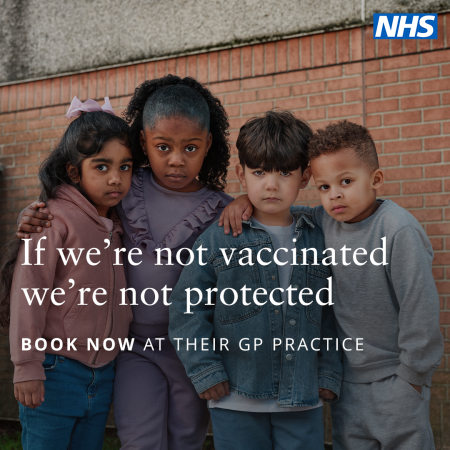
Parents across Yorkshire and The Humber are being urged to use the summer holidays to get children up to date with routine vaccinations before the new school term begins.
The UK Health Security Agency (UKHSA) is calling on families to make sure children are protected as latest data shows continued high levels of measles cases in some parts of the country, prompting fears of more outbreaks and a further surge in cases once children return to the classroom.
Regions with the lowest rates of vaccine uptake are of particular concern. The average uptake of two doses of the measles, mumps and rubella (MMR) vaccine by age 5, across the Yorkshire and The Humber region is 86%, dropping as low as 79% in some parts of the region. The World Health Organization (WHO) recommends that 95% uptake is needed to stop outbreaks occurring and protect the population. This means many thousands of children in our region are unprotected against these diseases, and the risk of outbreaks occurring whilst measles is circulating around the country remains high.
Areas in Yorkshire and The Humber region with the lowest uptake for two MMR vaccinations at 5 years old are Leeds with 79%, North Lincolnshire with 80%, and Doncaster with 82%. The East Riding of Yorkshire is the highest at 94%.
The most recent measles data shows there have been 674 laboratory confirmed cases reported in England since 1 January, with 145 notified between 3 and 31 July 2025. Almost half of all cases (48%) have been seen in London (322/674), with 16% in the North West (111/674), and 10% in the East of England (65/674). In the same time period cases in Yorkshire and The Humber accounted for 5% (37/674).
As there has been a rise in measles cases globally, including Europe, over the last year, there are concerns that anyone unvaccinated going on holiday abroad could
develop measles and bring it back home, leading to further outbreaks in areas with low MMR uptake.
This year measles outbreaks have been seen in several other European countries, including France, Italy, Spain and Germany, and WHO recently reported that Romania, Pakistan, India, Thailand, Indonesia and Nigeria currently have some of the largest numbers of measles cases worldwide.
Clare Foster, Consultant in Public Health from UKHSA Yorkshire and Humber, said: “Measles is a virus which spreads very quickly in communities where people are unvaccinated, especially in nurseries and schools. It can lead to serious health problems including ear and chest infections and inflammation of the brain, with some children requiring hospital admission and developing permanent disabilities. In rare cases, it can even be fatal.
“As children under the age of one are not vaccinated against measles, it’s important that older siblings are vaccinated to protect little ones and other vulnerable people – including those with weakened immune systems – who are unable to have the MMR vaccine and rely on others to protect them from measles.
“Before children start full-time school, they should have had two MMR vaccines, giving them the best protection against measles, mumps and rubella.
“Please take advantage of the summer break to check your children are up-to-date with all their vaccinations, including MMR. If you are unsure about your child’s vaccination record, you can check their Red Book, the NHS app or contact your GP surgery. It takes around two weeks following vaccination to ensure strong protection, so please book an appointment as soon as possible.”
Further information on when to have MMR and other childhood immunisations is available on the NHS website.